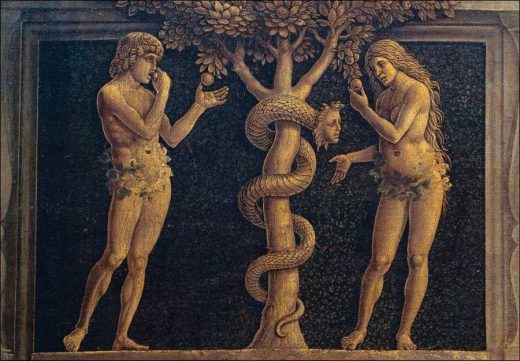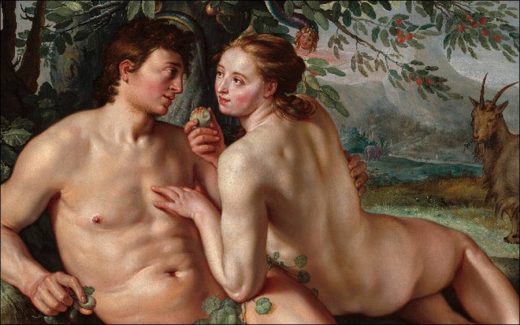How is the creation story of the first human being told in different religions and symbolic texts?
The myths and symbolic stories told about the first human couple have survived to the present day, since it is important in all times how life started in the world in terms of teachings. It will be useful for us, philosopher candidates, to make a comparison in which we examine the similarities and differences in these texts and to think about their symbolic expansions.
First, let’s look at the etymological origins of Adam and Eve:
the name of Adam; In Kabbalah, he is the only creature. It also means red earth. Adamu in Sumerian; my father, Adamu in Assyro-Babylonian; made, child, young, Sabian Man; kul, in Hebrew Adamah; earth, earth, and the word Adam in ancient eastern languages means earth or belonging to the earth, that is, human / humanity.
Eve: Her name is Hawah in Hebrew and the Torah, Eva in the Greek translation of the Torah, Heva in Latin, and Eve in western languages. According to the Torah, Adam gave the name Eve, which means “alive, living”, which means the mother of everything that exists. It is claimed that it comes from the root of Hayah Hayat and this word means to live, to keep alive.
Eve is identified with the Goddess Heba, who was the wife of the Hittite Storm God and rode naked on the back of a lion, and was also known as Hebe, the wife of Heracles among the Greeks.
In particular, we see that in Judaism, Christianity and Islam, the subject of creation and Adam and Eve, who are accepted as the first people, are emphasized. Now, let’s talk a little bit about how creation appears in these three religions.
Adam and Eve in the Torah and Bible
In the Torah, we come across two stories of creation, one after the other. While the first is about creation, the second is more about the creation of the first human couple.
According to the first story in the book, creation took place gradually in six days, and Elohim (God) first created the heavens and the earth. In other words, he first brought the elements of air and earth, and then water and living things. On the sixth day, he creates Adam in his own image, who will rule all nature. This living thing is human; will end the chaos and shape the universe. On the seventh day, Elohim begins to watch his work.
In the Bible, as in the Torah, God first created the sky and the earth, then created the light, the sky and the waters. He in turn created the land, the sea-plants, the stars, the creatures of the sea and the sky, and then the animals on the land. God created man in his image, male and female, to be fruitful and dominate all living things on earth. This chain of creation lasted six days. He designated the seventh day as a holy day.
This story bears the traces of Babylonian and Sumerian myths. It is reminiscent of Marduk, who created the earth from half of his own body and the sky from the other half, and created man to act on behalf of the Gods on the earth he created.
The second story in the Torah is; The earth was originally a desert with no plants. Then a mist rises from the ground and waters the whole earth. In the wet earth Elohim creates man and breathes into him through his nose. He makes a garden in Eden for the people he created in the East. This name; In Hebrew it is Eden. This word, which is Edinu in the Assyrian and Babylonian languages, and Edin in the Sumerian language, means “plain, steppe”.
In the middle of this garden, which has all kinds of plants, there is a tree of life and a tree of knowledge. A four-armed river stretches out to irrigate the garden. These are known as Pişon, Gihon, Tigris and Euphrates. He then creates animals and Eve from Adam’s rib. God advises man to benefit from all kinds of blessings in the garden, but not to eat anything from the tree of knowledge.
Here, we see that there are two important trees and four rivers, as in the Gilgamesh Mythology, which seeks immortality. Later, in the third chapter of Genesis, Eve encounters the serpent and insists that she eat from the tree of knowledge. Even though Eve tells the snake why they should not eat it, the snake says that Adam and Eve will not die, that if they eat the fruit, they can know good and bad and gain the same characteristics as God. Eve is convinced, first she eats her own fruit, then persuades Adam to give him the forbidden fruit.
Now their eyes have been opened and they felt the need to cover their natural nakedness. Seeing this, God realizes that they ate the forbidden fruit, learns how the incident developed, and tells the snake first and then the woman that he will have a hard life. Adam, on the other hand, will be a land-dependent being throughout his life. Eternal life was thus taken from man’s hands, and the story then continues with his sons Abel and Cain.
Adam and Eve in the Qur’an
In the Qur’an, the creation of Adam is mentioned in many verses. Let’s see how and where it goes without going into too many comments.
In the 59th verse of the chapter of Al-i Imran, the creation of the first man is described as follows: “Indeed, the situation of Jesus in the sight of Allah is like the situation of Adam; He formed it from dust, then said to it “Be!” he said, and that was right away.”
The substance from which Adam was created is mentioned in many verses. These substances are referred to as soil (turab), water (mâ’), mud (tin), fluid or filtered mud (shalâle min tîn), sticky mud (tîn lâzib), dried mud (salsal). (Hijr, 15/26, Rahman, 55/14, Saffat, 37/11, Prostration, 32/7, Mu’minun, 23/12, Enam, 6/2, Taha, 20/55, Rum, 30/20 , Isra, 17/61; A’raf, 7/12; Sad, 38/76, Saffat, 37/11, Mü’minun, 23/12, Hijr, 15/27; Rahman, 55/4, Prostration, 32 /7)
“He is the one who makes the best of everything he has created and who starts the creation of man from clay. 8Then he made his offspring from a substance, simply from water. 9Then he corrected it, made it into a form, and informed him. He created ears, eyes and hearts for you too.” Prostration, 7-9
“He created you from a single soul, then made its mate out of it.”; Zumer,6;
“… We have formed you from soil, then from nutfah, then from an embryo, then from a piece of flesh with an indistinct structure… Hajj, 5
“O people! Enter under the protection of your Lord, who formed you from a single soul, formed its mate from it, and produced and dispersed many men and women from both. “Nisa, 1
“And We said, “O Adam! You and your spouse settle in heaven/stay here, both of you get plenty of it wherever you want, and don’t get close to this intricate thing; We said, “Do not be a lover of wealth/gold-silver, otherwise you will be one of those who do injustice to your own selves.” Baccarat, 35
As we see in almost all verses about creation, the story of creation carries the same traces in the Qur’an.
Continue Reading: Rib and heaven in different religious texts.
Visits: 189




